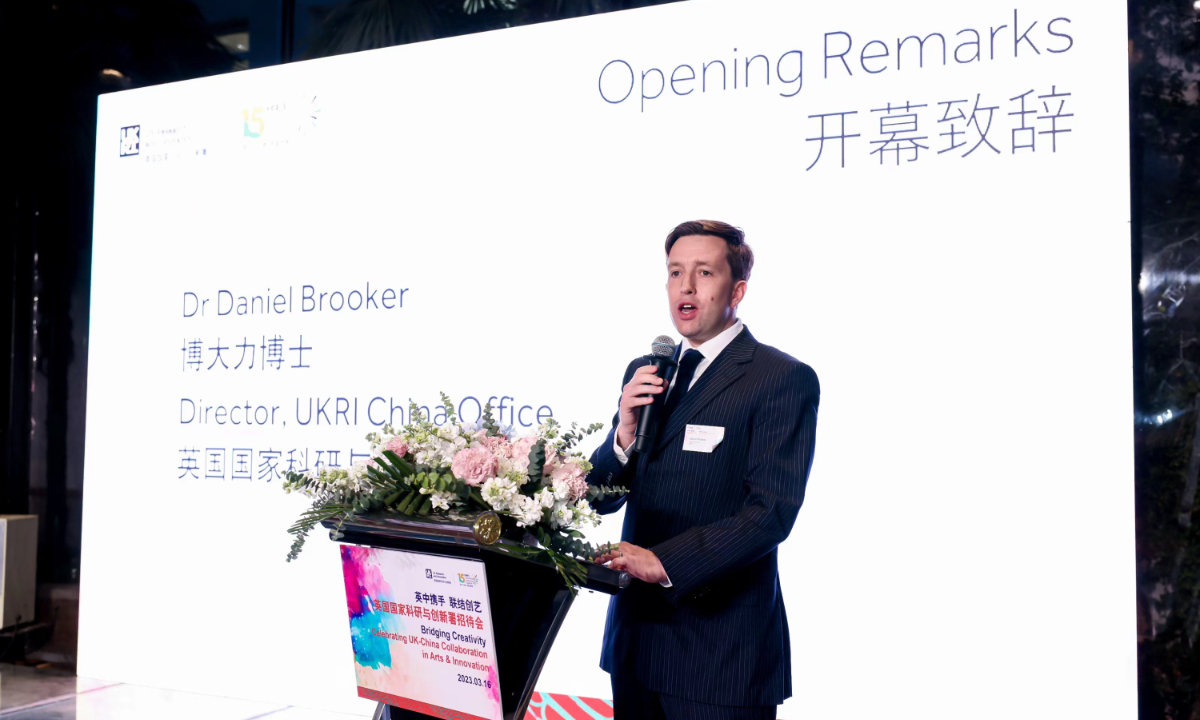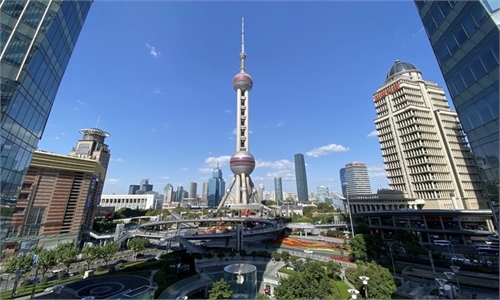ARTS / CULTURE & LEISURE
UKRI to build creative links between UK and China

Daniel Brooker, Director of UKRI China delivers opening remarks at the event on March 16. Photo: Courtesy of UKRI China
UK Research and Innovation (UKRI) is planning to establish a UK China Creative Industries Hub, with locations in both China and the UK to scale up exchanges between the two countries in the arts and creative industries, the Global Times learned from the UKRI at a reception event on Thursday celebrating the 15th anniversary of its office being set up in China.
With a theme of "Bridging Creativity: Celebrating UK-China Collaboration in Arts & Innovation” the event brought together key stakeholders including academics, government officials, and business partners in the arts and creative field, aiming to showcase the achievements and impact of UKRI-funded projects in the arts and creative field and explore potential opportunities for further bilateral collaboration.
The UKRI China office was set up in 2007 to foster and build collaborations and bring together the expertise of two leading research and innovation nations in the pursuit of shared interests and mutual benefit.
In the past 15 years, the Arts and Humanities Research Council (AHRC) and other councils under the UKRI have worked closely with Chinese counterparts.
From museum exchange and joint cultural performances to gaming and sustainable fashion, the event showcased some highlighted funding programs out of its broad-ranging portfolio.
For example, UKRI-AHRC is supporting a collaboration between Nottingham University, the Tate Gallery, and the Shanghai Science Museum to investigate how museums can use virtual reality to enhance the museum-going experience, and how museum collections can be shared virtually, so scholars and art-browsers in the UK and China can access collections without ever getting on a plane.
The Augmented Fashion Project delivered by the Robert Gordon University, Donghua University and their industry partner Harris Tweed Hebrides aims to determine how immersive interactions can be used to communicate the experience and value of creative, artisan fashion and textile products, with a focus on culture, provenance, heritage and sustainable clothing consumption.
In addition, Shanghai Jiaotong University has led a project focusing on the UK-Shanghai collaboration on mixed reality, performing arts and visual film production, using virtual reality technology to help people better understand the culture and history of London and Shanghai.
Participants listen to the presentation of speakers at the event on March 16. Photo: Courtesy of UKRI China
The event showcased the outcomes of a long-standing collaboration between the UK, Chinese researchers and business innovators, said Chris Wood, British Consul-General in Shanghai, at the event.
“The UK and China have a long and fruitful history of collaboration in this field. I look forward to seeing the future work and impacts that arise from the UKRI’s collaborations with Shanghai on arts and the creative industries,” Wood said.
Daniel Brooker, director of UKRI China, told the Global Times that they are busy planning future programs and future activities that can help to facilitate future exchanges between the UK and Chinese researchers and innovators for 2023.
For 2023, UKRI China is hoping to launch a new program in the coming months to bring UK and Chinese researchers together in health, medical and biological research to prevent and tackle infectious diseases and to prevent epidemics.
This year, UKRI China is also looking at programs to tackle climate change as both China and the UK are committed to carbon neutrality.
The next step is to establish a UK China Creative Industries Hub, which would be a physical resource in Shanghai, but also with a location in the UK, breaking down barriers to collaboration and scaling up the work that has happened in China and the UK.
“I think 2023 will be a good year, an important year for the UK and China to work together on some of our research and innovation partnerships. A lot of work can now happen with face to face dialogues, meetings and workshops,” he said.
Brooker said that since the reopening of the borders and the opening of international travel, there has been strong interest from UK researchers and innovators to resume some of the partnerships. The recent adjustment of the Chinese visa and policy of entry to China has been a really important step to facilitate the exchanges, he said.
“I think the new visa announcement makes it easier for both tourists and business visitors. I think this is a really important step to enable researchers to bring together their expertise and work on important joint programs that can bring significant, scientific and social benefit and impact. So I'm feeling optimistic. I'm really hopeful,” Brooker said.

